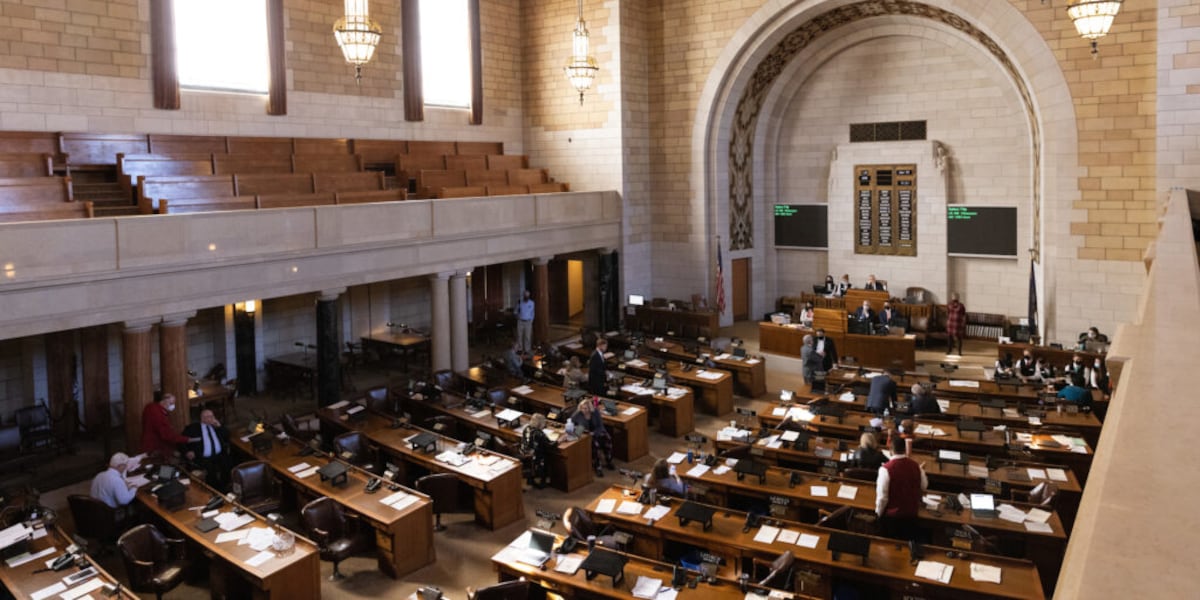LINCOLN, Neb. (KOLN) — State lawmakers voted not to regulate medical marijuana under a new law Tuesday, possibly pushing off its implementation in Nebraska.
Senators debated LB677 and an amendment crafted in the General Affairs committee and ultimately decided to save any regulation of medical marijuana for the 2026 Legislative Session. The bill and its amendment, crafted as a compromise to bring the full bill to the floor for debate, provided guidelines in implementing and taxing medical marijuana.
Under the amendment, Nebraskans with a condition qualifying for medical marijuana could possess up to two ounces of flower cannabis, edibles, topicals, vaporizer cartridges and concentrates. Though flower would have been legal, the amendment did not allow smoking. Flower could, however, have been ingested by multiple other methods, including vaping.
Current law, which was enacted by Nebraska voters with Initiatives 437 and 438, would have allowed possession of up to five ounces of medical marijuana.
The amendment also clarified who could qualify for medical marijuana and how one could receive eligibility for medical marijuana. Those diagnosed with the following conditions and receiving a written recommendation from a health care practitioner would have been eligible for medical marijuana under LB677:
Amyotrophic lateral sclerosisAutism with frequent or self-injurious or aggressive behaviorCancerCrohn’s disease or ulcerative colitisEpilepsy or epileptic seizuresHepatitis C that causes moderate to severe nausea or cachexiaHIV or AIDSHunting’s diseaseParkinson’s diseaseSpinal cord injury or disease with residual neurological deficitsTerminal illness with a probable life expectancy of under one yearTourette’s syndromeA serious medical condition, or treatment of a serious medical condition, that causes severe nausea or cachexiaSevere and persistent muscle spasms caused by multiple sclerosis, spinal cord injury or muscular dystrophySevere or chronic pain lasting longer than six months that is not adequately managed, in the opinion of a health care practitioner, despite treatment attempts using conventional medication other than opioids or opiates or physical interventions
Attorney General Mike Hilgers has been fighting the implementation of medical marijuana under Initiatives 437 and 438, citing fraud found in a small number of signatures. Though a few hundred signatures were found to be fraudulent, the number did not pull either initiative under the threshold to be enacted into law.
Though his argument has failed in two courts, Hilgers hopes the Nebraska Supreme Court will side with him and invalidate both initiatives. Some senators worried that enacting LB677 would create the framework for medical marijuana even if the Nebraska Supreme Court found the initiatives’ signatures invalid.
SEE ALSO: Judge dismisses lawsuit dealing with medical marijuana petition signatures
Hilgers, along with several senators, also argued that legalizing flower was tantamount to legalizing recreational marijuana. The bill, however, would require Nebraskans to get the written recommendation for the drug after being diagnosed with one of 15 illnesses.
The Nebraska Medical Cannabis Regulation Act created the Nebraska Medical Cannabis Commission. The act gives the commission authority to fully regulate medical marijuana and enforce its rules, and several senators questioned why the Legislature would need to begin regulatory processes for the commission.
The commission must establish criteria to accept or deny applications for medical marijuana by July 1, and the commission must begin issuing those registrations by Oct. 1. The bill would have provided legislative guidelines, largely more conservative than the language voters overwhelmingly agreed to, to those registrations.
On Thursday, senators will vote on two appointments to the commission made by Gov. Jim Pillen. The act says the commission must have between three and five members, two of whom are appointed by the governor and approved by the Legislature and three members from the Nebraska Liquor Control Commission.
Gov. Pillen’s appointees, Lorelle Mueting and Monica Oldenburg, have both consistently voiced opposition to the legalization of medical marijuana in Nebraska.
According to Gov. Pillen, Mueting and Oldenburg are, “two experienced, well-qualified individuals to the Medical Cannabis Commission, who will ensure this new industry is strongly regulated to the letter of the law the people of Nebraska enacted.”
Click here to subscribe to our 10/11 NOW daily digest and breaking news alerts delivered straight to your email inbox.
Copyright 2025 KOLN. All rights reserved.
State lawmakers voted not to regulate medical marijuana under a new law Tuesday, possibly pushing off its implementation in Nebraska. Read More


